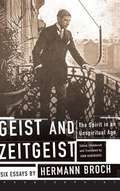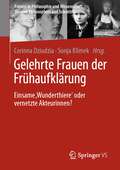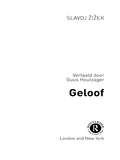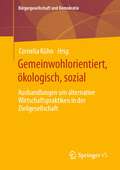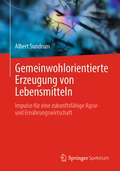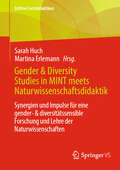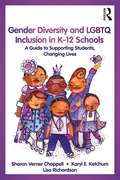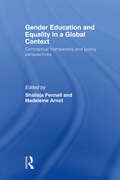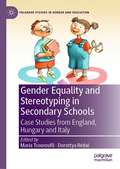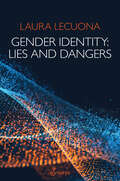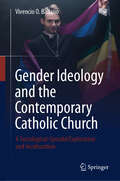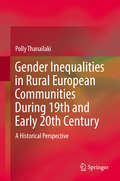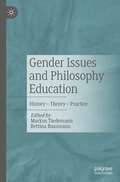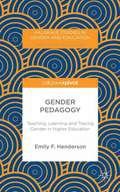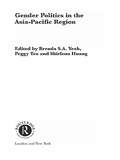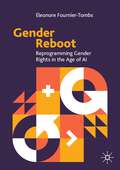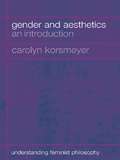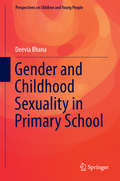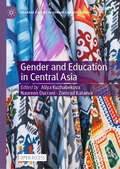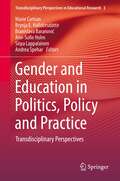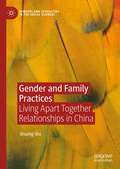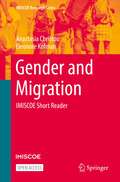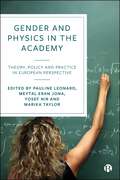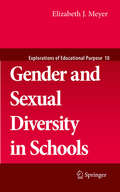- Table View
- List View
Geist And Zeitgeist: The Spirit In An Unspiritual Age
by John Hargraves Hermann BrochHermann Broch achieved international recognition for his brilliant use of innovative literary techniques to present the entire range of human experience, from the biological to the metaphysical. Concerned with the problem of ethical responsibility in a world with no unified system of values, he turned to literature as the appropriate form for considering those human problems not subject to rational treatment. <p><p> Late in life, Broch began questioning his artistic pursuits and turned from literature to devote himself to political theory. While he is well known and highly regarded throughout the world as a novelist, he was equally accomplished as an essayist. These six essays give us a fascinating glimpse into the mind of one of the twentieth century's most original thinkers.
Gelehrte Frauen der Frühaufklärung: Einsame ‚Wunderthiere‘ oder vernetzte Akteurinnen? (Frauen in Philosophie und Wissenschaft. Women Philosophers and Scientists)
by Corinna Dziudzia Sonja KlimekDieser Band versammelt die Beiträge einer Tagung, die im Februar 2019 mit Unterstützung des Forschungsverbunds Marbach Weimar Wolfenbüttel und der Dr. phil. Fritz Wiedemann Stiftung in der Herzog August Bibliothek in Wolfenbüttel stattfand. Ziel der interdisziplinären Veranstaltung war es, die Frühaufklärung als eine Zeitspanne sichtbar werden zu lassen, in der sich für Frauen, wenngleich teilweise nur vorübergehend, zahlreiche Tätigkeitsfelder eröffneten, sei dies als Ärztinnen, Malerinnen, Kupferstecherinnen oder Dichterinnen. Frauen führten in dieser Zeit europaweit gesellige, gelehrte und/oder musikalische Salons und betätigten sich als Mäzeninnen oder selbst als hochgeschätzte Musikerinnen und Komponistinnen. Universitäten, Akademien und Gesellschaften verliehen den gelehrten Frauen im 17. und 18. Jahrhundert Preise und sogar Doktorwürden. Darüber hinaus wurden Frauen in der Frühaufklärung als malende, kämpfende, rechnende, experimentierende, übersetzende und heilende Frauen aktiv.
Geloof (Routledge filosofie)
by Slavoj ZizekHoe kunnen we nog geloven en regels hebben in dit postmoderne tijdperk waarin naar verluidt niets is om in te geloven en geen regels zijn. De beroemde filosoof en onstuitbaar cultuurcriticus Slavoj Zizek daagt iedereen uit in dit overtuigende en adembenemende nieuwe boek.In Geloof, dat van 'cyberspace-denken' tot de paradox van het 'westerse boeddhisme' gaat, legt Zizek de vooronderstellingen bloot achter de manier waarop we gewoonlijk over geloof denken, met name in judaïsme en christendom. Door de zogenaamde authenticiteit van het religieuze geloof tegen een kritisch licht te houden en te putten uit psychoanalyse, film en filosofie, laat hij op schokkende wijze zien dat de basis van onze fundamenteelste overtuigingen minder rotsvast is dan wij denken.
Gemeinwohlorientiert, ökologisch, sozial: Aushandlungen um alternative Wirtschaftspraktiken in der Zivilgesellschaft (Bürgergesellschaft und Demokratie)
by Cornelia KühnDer Klimawandel gefährdet die Existenzgrundlage zukünftiger Generationen. Damit zukunftsfähige und klimaverträgliche Gesellschaften entstehen können, sind tiefgreifende Änderungen von Produktionsprozessen, aber auch von Konsummustern und Lebensstilen notwendig. In diesem Sammelband werden Möglichkeiten und Grenzen der Ausweitung alternativer Wirtschafts- und Lebensformen erkundet. Dabei werden kleine Unternehmen und nachhaltige Bildungsinitiativen genauso betrachtet wie Regionen, Berufszweige und Großunternehmen auf ihrem Weg in eine nachhaltige Zukunft.
Gemeinwohlorientierte Erzeugung von Lebensmitteln: Impulse für eine zukunftsfähige Agrar- und Ernährungswirtschaft
by Albert SundrumLebensmittel sind Mittel zum Leben. Die Art und Weise ihrer Erzeugung betrifft uns alle. Weitgehend unbemerkt von der öffentlichen Wahrnehmung hat sich in den vergangenen Jahrzehnten ein System der Agrar- und Ernährungsindustrie entwickelt, das uns mit einer Fülle von Nahrungsmitteln mit zu niedrigen Preisen versorgt.Die unerwünschten Nebenwirkungen und externen Kosten dieses Systems wurden jedoch lange Zeit ausgeblendet. Enorme Umwelt- und Klimabelastungen, Verlust der Biodiversität, tierschutzrelevante Missstände und ein anhaltendes Hofsterben beschreiben nur unzulänglich das wahre Ausmaß an Schadwirkungen. Im Interesse des Gemeinwohls können diese nicht länger hingenommen werden. Allerdings stehen die Komplexität der Sachverhalte und vielfältige Partikularinteressen einfachen Lösungen entgegen.Dieses Fachbuch liefert eine umfassende systemische Analyse aus sehr unterschiedlichen Perspektiven und erläutert, wie es zu dieser Entwicklung hat kommen können. Es wird aufgezeigt, welche grundlegenden Veränderungen in allen Bereichen erforderlich sind, um über eine evidenzbasierte Qualitätserzeugung einen Ausweg aus dem zerstörerischen Streben nach Kostenminimierung zu finden. Fachkräfte der Agrar- und Ernährungsindustrie und der involvierten wissenschaftlichen Fachdisziplinen, einschließlich der Veterinärmedizin, sowie Entscheidungsträger in politischen Institutionen, Berufsverbänden und NGOs können dieses Wissen für eine zukunftsfähige Neugestaltung des Lebensmittelsektors nutzen.
Gender & Diversity Studies in MINT meets Naturwissenschaftsdidaktik: Synergien und Impulse für eine gender- & diversitätssensible Forschung und Lehre der Naturwissenschaften (Edition Fachdidaktiken)
by Martina Erlemann Sarah HuchGender und dessen Zusammenwirken mit weiteren Diversity-Dimensionen wie etwa soziale Herkunft, ein (zugeschriebener) Migrationshintergrund oder sexuelle Orientierung stehen an Hochschulen verstärkt im Fokus. Gefordert sind dabei auch gender- und diversitysensible Ausrichtungen der Forschung und Lehre der MINT-Fächer sowie der hochschulischen Lehramtsausbildung für MINT. Welche inhaltliche Relevanz haben Gender- und Diversity-Aspekte in Fachkultur, Forschungsinhalten sowie im Wissenschaftsverständnis der Naturwissenschaften? Wie strukturieren Geschlecht und andere soziale Differenzkategorien die Forschung? Wie kann eine Gender- und Diversity-Kompetenzen vermittelnde Lehrer*innenbildung aussehen?Auf diese Fragen geben die interdisziplinären Beiträge der Wissenschaftler*innen, etwa aus Physik, Biologie, Medizin, Feminist Science & Technology Studies sowie die naturwissenschaftlichen Fachdidaktiken Antworten. Ansätze sowie Wissensbestände der Gender & Diversity Studies in MINT werden mit den gender- und diversityausgerichteten Naturwissenschaftsdidaktiken zusammengeführt. Mit vielfältigen Anregungen ermutigen sie zu einer gender- und diversityorientierten Ausrichtung der (eigenen) Forschung und Lehre.
Gender Diversity and LGBTQ Inclusion in K-12 Schools: A Guide to Supporting Students, Changing Lives
by Sharon Verner Chappell Karyl E. Ketchum Lisa RichardsonThis exploration of effective practices to support lesbian, gay, bisexual, transgender, queer (LGBTQ) and gender-diverse students in elementary, middle, and high school contexts focuses on curriculum, pedagogy, and school environment. Narratives and artwork from the field are framed by sociocultural and critical theory as well as research-based elaboration on the issues discussed. Applications of antidiscrimination law and policy, as well as learning skills like creativity, collaboration, and critical thinking help teachers tackle some of the most significant educational challenges of our time. The stories of real-world practices offer encouragement for building inclusive environments and enhancing social-emotional relationships among youth, families, and schools. Gender Diversity and LGBTQ Inclusion in K-12 Schools provides a helpful roadmap for educators hoping to create safe and empowering spaces for LGBTQ and gender-diverse students and families.
Gender Education and Equality in a Global Context: Conceptual Frameworks and Policy Perspectives
by Shailaja Fennell Madeleine ArnotThe Millennium Development Goals aim to achieve basic education for all by 2015. But can such global agendas address national and local gender inequalities and will they empower women through education? This thought-provoking book offers an opportunity to engage critically with existing and emergent conceptual frameworks and methodological approaches to this global debate. It is divided into three sections that: reconceptualise the definitions of gender equality used by various social scientific disciplines, international organisations and policy makers; illustrate the methodologies used to collect the voices of young men and women and their teachers telling stories of their success in lifting the burdens of poverty and negotiating traditional gender relations; trace the impact of global gender agendas on national education policies, such as citizenship education, poverty reduction strategies, and feminist activism around adult women’s learning. Gender Education and Equality in a Global Context is an invaluable introduction to the range of conceptual frameworks and innovative research methods that address issues of gender education and development.
Gender Equality and Stereotyping in Secondary Schools: Case Studies from England, Hungary and Italy (Palgrave Studies in Gender and Education)
by Maria Tsouroufli Dorottya RédaiThis book explores gender stereotyping and gender inequalities in secondary education in England, Hungary and Italy. The authors highlight the importance of addressing student and teacher attitudes if long-term changes in mindset are desired, as well as the underlying stereotypes that persist and linger in these educational contexts. Promoting a whole-school culture change approach, this book explores views of gender stereotypes from teachers and students concerning subject and career choices, as well as collaborative work with teachers, experts and NGOs in implementing and evaluating gender equality charters. Drawing on extensive research, this book employs an intersectional and cross-country approach: while the authors acknowledge the challenges and opportunities of researching gender equality frameworks across different countries, ultimately these link to the UN Sustainable Development goal of gender equality.
Gender Identity: Lies and Dangers
by Laura LecuonaThousands of pages of books, millions of characters in tweets and hundreds of blogs have been devoted to explaining the distinction between sex and gender, but far from clarifying anything, bewilderment for ordinary people is only growing.The concept of gender is central to a vaguely progressive-looking set of ideas based on the maxim that people possess a so-called ‘ gender identity' . The real problem arises when this nebulous concept, bandied about with different and even incompatible meanings by different groups, is used as a prop to introduce policies that mark a huge setback for the rights of women and girls. The general public, watching the controversy from the sidelines, is confused by conflicting claims about whose rights are being infringed.In this incisive book, Laura Lecuona sets the record straight by reviewing the origin of the current uses of the key term gender and exploring the main theories of transgenderism. She discusses what lies behind the claims about pronoun usage and warns about the consequences of promoting the recognition of so-called transgender children. She points out the collateral damage arising from this activism, from the perpetuation of sexist roles to limitations on freedom of speech. She dares to confront the accusations of transphobia that often inhibit those who question the foundations of this financially-driven and increasingly dominant ideology and shows the devastating effects transactivism is having on women, both socially and politically. Gender Identity: Lies and Dangers is essential reading for the urgently needed conversation we need to have about whose interests are being served with the advancement of transgender ideology and what this means for women' s sex-based rights.
Gender Ideology and the Contemporary Catholic Church: A Sociological-Synodal Exploration and Inculturation
by Vivencio O. BallanoThis book sociologically investigates the contemporary Catholic Church’s stance on gender diversity and “gender ideology” and explores ways to adapt the social science perspectives on sex, gender, and gender fluidity in the Church’s moral teachings, applying Pope Francis’s inductive synodal theology. Using the sociological theories on gender, moral panics, and morality and drawing on secondary literature, media reports, and church documents, it specifically unpacks the “gender ideology’s” alleged grave threats to humanity, family, children, and human dignity as moral panics as well as examines the Catholic morality of gender-enhancement treatment and sex change. Ultimately, this book aims to inculturate or adapt the contemporary sociological gender theory and research in the Catholic Church’s moral doctrines as a synodal response to the “signs of the times.” It therefore appeals to church authorities, moral theologians, LGBTQI leaders, as well as scholars and students of sociology, religion, and gender studies.
Gender Inequalities in Rural European Communities During 19th and Early 20th Century: A Historical Perspective
by Polly ThanailakiThis book provides an overview of women’s opportunities for schooling, their social activities, and the social biases they faced in rural communities in Greece, Italy and parts of the Balkans during the 19th and early 20th century. It examines such topics as female illiteracy, the efforts of women-protestant missionaries to expand knowledge through Protestantism, the prejudice against education for women, the socio-economic context, the roles women fulfilled, and the structure of the patriarchal family. The book approaches these issues from the perspective of pedagogy and social history. The fundamental questions discussed by the book are: How was female education viewed by the country folk? What was the role of women in the private and the public sphere? How did peasant women respond to the challenges of the ‘modern’ world? Were they free to express their feelings and ambitions? In what way? Were they happy?
Gender Issues and Philosophy Education: History – Theory – Practice
by Markus Tiedemann Bettina BussmannWith this volume a gap in the philosophical didactics is closed. A historical section initially introduces authors who have determined the gender discourse and at the same time a critical discussion. This is followed by an overview of sexual and gender diversity, its basics and differentiations. Theoretical papers then deal with the relevance of gender research for the self-understanding of philosophical education. Finally, practice-specific contributions demonstrate how topics and aspects of the gender problem can be prepared for different age groups and school types. With 2 lesson plans.
Gender Pedagogy: Teaching, Learning and Tracing Gender in Higher Education
by Emily F. HendersonWhen addressed in its full reactive potential, gender has a tendency to unfix the reassuring certainties of education and academia. Gender pedagogy unfolds as an account of teaching gender learning that is rooted in Derrida's concept of the 'trace', reflecting the unfixing properties of gender and even shaking up academic knowledge production.
Gender Politics and Mass Dictatorship
by Karen Petrone Jie-Hyun LimUsing mass dictatorship as a working hypothesis to comprehend support for dictatorship from below, this book concentrates on the gender politics deployed by dictatorial regimes such as Nazism, Stalinism, 'really existing socialism' in the GDR and People's Poland, Maoist China, the development dictatorship in South Korea, and colonial empires. 20th century dictatorial regimes used gender politics as a lever to mobilize men and women as voluntary participants in state projects. Ironically enough, women under dictatorships could become important players in the previously male-dominated public sphere in exchange for voluntary mobilization. But both men and women were not passive objects of gender politics. Men both embraced and rejected the masculine roles set out for them; and the dictatorial regimes' invitation to participate in the public sphere, designed for the self-mobilization of women, was often used by women for self-empowerment. This book shows the twisted paths of citizens' lives under the dictatorial regimes as they veered between self-mobilization and self-empowerment.
Gender Politics in the Asia-Pacific Region (Routledge International Studies of Women and Place #No.3)
by Brenda S.A. Yeoh Peggy Teo Shirlena HuangAmidst the unevenness and unpredictability of change in the Asia-Pacific region, women's lives are being transformed. This volume takes up the challenge of exploring the ways in which women are active players, collaborators, participants, leaders and resistors in the politics of change in the region. The editors focus attention on the politics of gender as a mobilizing centre for identities, and the ways in which individualized identity politics may be linked to larger collective emancipatory projects based on shared interests, practical needs, or common threats. Collectively, the chapters illustrate the complexity of women's strategies, the diversity of sites for action, and the flexibility of their alliances as they carve out niches for themselves in what are still largely patriarchal worlds. This book will be of vital interest to scholars in a range of subjects, including gender studies, human geography, women's studies, Asian studies, sociology and anthropology.
Gender Reboot: Reprogramming Gender Rights in the Age of AI
by Eleonore Fournier-TombsThis book explores gender norms and women’s rights in the age of AI. The author examines how gender dynamics have evolved in the spheres of work, self-image and safety, and education, and how these might be reflected in current challenges in AI development. The book also explores opportunities in AI to address issues facing women, and how we might harness current technological developments for gender equality. Taking a narrative tone, the book is interwoven with stories and a reflection on the raising young children during the COVID-19 pandemic. It includes both expert and personal interviews to create a nuanced and multidimensional perspective on the state of women’s rights and what might be done to move forward.
Gender and Aesthetics: An Introduction (Understanding Feminist Philosophy)
by Carolyn KorsmeyerFeminist approaches to art are extremely influential and widely studied across a variety of disciplines, including art theory, cultural and visual studies, and philosophy. Gender and Aesthetics is an introduction to the major theories and thinkers within art and aesthetics from a philosophical perspective, carefully introducing and examining the role that gender plays in forming ideas about art. It is ideal for anyone coming to the topic for the first time. Organized thematically, the book introduces in clear language the most important topics within feminist aesthetics: Why were there so few women painters? Art, pleasure and beauty Music, literature and painting The role of gender in taste and food What is art and who is an artist? Disgust and the sublime. Each chapter discusses important topics and thinkers within art and examines the role gender plays in our understanding of them. These topics include creativity, genius and the appreciation of art, and thinkers from Plato, Kant, and Hume to Luce Irigaray and Julia Kristeva. Also included in the book are illustrations from Gaugin and Hogarth to Cindy Sherman and Nancy Spero to clarify and help introduce often difficult concepts. Each chapter concludes with a summary and further reading and there is an extensive annotated bibliography. Carolyn Korsmeyer's style is refreshing and accessible, making the book suitable for students of philosophy, gender studies, visual studies and art theory, as well as anyone interested in the impact of gender on theories of art.
Gender and Childhood Sexuality in Primary School
by Deevia BhanaThis book is an ethnography of teachers and children in grades 1 and 2, and presents arguments about why we should take gender and childhood sexuality seriously in the early years of South African primary schooling. Taking issue with dominant discourses which assumes children's lack of agency, the book questions the epistemological foundations of childhood discourses that produce innocence. It examines the paradox between teachers' dominant narratives of childhood innocence and children's own conceptualisation of gender and sexuality inside the classroom, with peers, in heterosexual games, in the playground and through boyfriend-girlfriend relationships. It examines the nuances and finely situated experiences which draw attention to hegemonic masculinity and femininity where boys and girls challenge and contest relations of power. The book focuses on the early makings of gender and sexual harassment and shows how violent gender relations are manifest even amongst very young boys and girls. Attention is given to the interconnections with race, class, structural inequalities, as well as the actions of boys and girls as navigate gender and sexuality at school. The book argues that the early years of primary schooling are a key site for the production and reproduction of gender and sexuality. Gender reform strategies are vital in this sector of schooling.
Gender and Education in Central Asia (Palgrave Studies in Gender and Education)
by Naureen Durrani Aliya Kuzhabekova Zumrad KataevaThis open access book brings together established and emerging scholars to explore policies, statistical trends and representative research on gender equity across post-Soviet Central Asia. The book provides an overview of policy development in the promotion of gender equity, a comparative summary of changes in gender equity indicators at various levels of education, and examples of current research on an array of issues relating to gender equity across the region. The chapters present a broad picture which will be relevant to scholars of educational reform, comparative education policy, international development and gender issues.
Gender and Education in Politics, Policy and Practice: Transdisciplinary Perspectives (Transdisciplinary Perspectives in Educational Research #3)
by Andrea Spehar Marie Carlson Brynja E. Halldórsdóttir Branislava Baranović Ann-Sofie Holm Sirpa LappalainenThis book presents ideas on education, gender and intersectionality through a transdisciplinary frame by crossing disciplinary and methodological borders. Exploring the diversity of educational settings ranging from early childhood to adult education, it brings together scholars from various disciplines to discuss, deconstruct and problematize gender and education in relation to several themes in a comparative, intersectional, local, national, regional and international perspective. Each chapter approaches the topic in an intersectional and/or transnational manner and creates powerful gendered educational knowledge. Questions addressed in the book include: What are the challenges or barriers to gender-equal education? How can we understand the gaps between formal policies and educational practices? The chapters in the book illustrate how gender and education are relevant and needed concepts within the field of transdisciplinary research. The authors hail from a range of countries, such as Croatia, Indonesia, Turkey, UK, as well as the Nordic region, and they critically examine gender and education at all levels and in diverse sectors, and with varied lenses, such as neoliberalism in education, and the inclusion of newcomers and refugees. The work also critically investigates programs and pedagogical approaches, culture and values, knowledge and identity in teacher education. The book further addresses criticisms of Western and Anglophone bias around “white feminism” and the norm of white, male and heterosexual privilege.
Gender and Family Practices: Living Apart Together Relationships in China (Genders and Sexualities in the Social Sciences)
by Shuang QiuThis book examines how gender and heterosexuality structure the lived experiences of people in living apart together (LAT) relationships in contemporary Chinese society. Using in-depth interview data with Chinese LAT people of different ages, the author explores why they live apart; how they construct and make sense of their everyday family lives and negotiate their gender roles; and how they experience intimacy while being physically apart. This text sheds new insights on non-cohabitating intimate partnerships by bringing together themes of gender, family, intimacy, and relationality. Through looking at people’s lived experiences in LAT relationships, it argues that practices of family and intimacy are closely implicated with doing gender, and consequently, that gendered family lives and heterosexuality are reconstructed, rather than deconstructed, in order to reclaim conventional forms of family and gender norms in Chinese social, historical and cultural contexts.This book will be of interest to scholars across Gender and Sexuality Studies as well as Family Studies, in addition to scholars of contemporary Chinese culture and society.
Gender and Migration: IMISCOE Short Reader (IMISCOE Research Series)
by Eleonore Kofman Anastasia ChristouThis open access short reader offers a critical review of the debates on the transformation of migration and gendered mobilities primarily in Europe, though also engaging in wider theoretical insights. Building on empirical case studies and grounded in an analytical framework that incorporates both men and women, masculinities, sexualities and wider intersectional insights, this reader provides an accessible overview of conceptual developments and methodological shifts and their implications for a gendered understanding of migration in the past 30 years. It explores different and emerging approaches in major areas, such as: gendered labour markets across diverse sectors beyond domestic and care work to include skilled sectors of social reproduction; the significance of families in migration and transnational families; displacement, asylum and refugees and the incorporation of gender and sexuality in asylum determination; academic critiques and gendered discourses concerning integration often with the focus on Muslim women. The reader concludes with considerations of the potential impact of three notable developments on gendered migrations and mobilities: Black Lives Matter, Brexit and COVID-19. As such, it is a valuable resource for students, academics, policy makers, and practitioners.
Gender and Physics in the Academy: Theory, Policy and Practice in European Perspective
by Pauline Leonard, Meytal Eran Jona, Yosef Nir, and Marika TaylorThis innovative interdisciplinary collection confronts the worldwide challenge of women's under-representation in science through an interrogation of the field of physics and its gender imbalance. Leading physicists and sociologists from across Europe collaborate to adopt a comparative approach. They draw on theoretical perspectives and empirical evidence to explore the reasons behind low participation levels, from entering the field to sustaining a career, emphasising the importance of social perspectives over biological explanations. Evaluating policy solutions implemented in various European contexts, this book offers key insights into the world of women physicists and sheds light on their life stories.
Gender and Sexual Diversity in Schools
by Elizabeth J. MeyerIssues related to gender and sexual diversity in schools can generate a lot of controversy, with many educators and youth advocates under-prepared to address these topics in their school communities. This text offers an easy-to-read introduction to the subject, providing readers with definitions and research evidence, as well as the historical context for understanding the roots of bias in schools related to sex, gender, and sexuality. Additionally, the book offers tangible resources and advice on how to create more equitable learning environments. Topics such as working with same-sex parented families in elementary schools; integrating gender and sexual diversity topics into the curriculum; addressing homophobic bullying and sexual harassment; advising gay-straight alliances; and supporting a transgender or gender non-conforming student are addressed. The suggestions offered by this book are based on recent research evidence and legal decisions to help educators handle the various situations professionally and from an ethical and legally defensible perspective.
